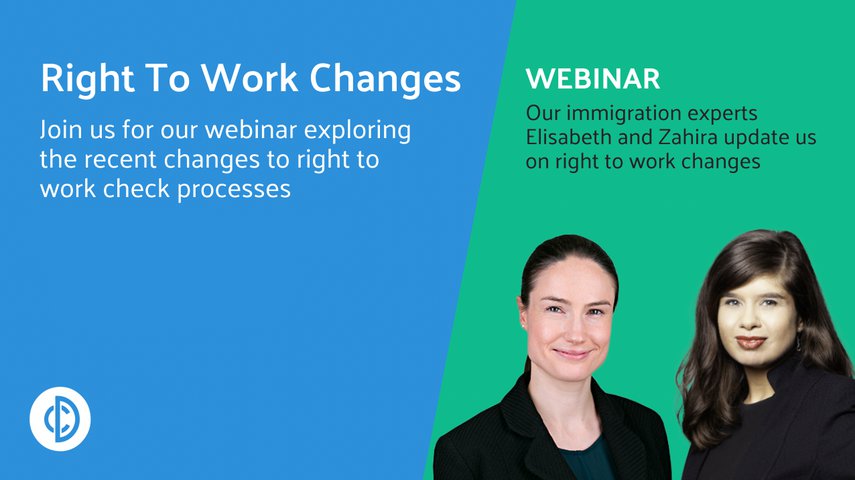Right to Work Checks - changes from 6 April

Changes to right to work check rules
As an employer, it is essential that you keep up to date with the changes to right to work check rules, to make sure that you are doing everything needed to carry out compliant checks on your staff. If you don’t then you could face serious illegal working penalties and could lose your sponsor licence.
There have been important changes to right to work check rules recently. In particular:
- Since March 2020, employers have seen the benefits of being able to carry out manual right to work checks remotely under the temporary Covid-19 adjusted provisions. The Home Office recently announced that this concession would be extended until 30 September 2022.
- Since 6 April 2022, employers have been required to follow the online right to work check process for individuals with a Biometric Residence Card (BRC), Biometric Residence Permit (BRP) and Frontier Worker Permit (FWP). You can no longer carry out manual right to work checks on physical documents for these individuals.
- Since 6 April 2022, employers have been allowed to use “Identification Document Validation Technology” (IDVT) to carry out “remote” right to work checks on British and Irish nationals with valid passports and passport cards instead of carrying out manual right to work checks.
Watch our recent webinar, where Zahira and Elisabeth guide you through the right to work check regime. They explore the recent changes to right to work check processes, share top tips and strategies to help you remain compliant and avoid illegal working penalties and answer your questions.
Topics covered include:
1. Overview of the Right to Work (RTW) regime and illegal working penalties
- What are right to work checks?
- When should you carry out right to work checks?
- Why should you do right to work checks?
- Who should you carry out right to work checks on?
2. How to complete right to work checks and changes since 6 April 2022
3. Record-keeping & reporting obligations
4. Practical tips
5. Q & A
Webinar Takeaways
The key points to take away from this webinar are:
- There are now 3 types of right to work check – (1) the online process (mandatory for some visa types – see below), (2) the manual process and (3) for British and Irish nationals, the new optional Identification Verification Technology (IDVT) process. Our webinar explains how to carry out each type of check.
- You must carry out right to work checks on new staff before they start their role in order to establish a statutory excuse against civil illegal working penalties.
- If an employee has time-limited permission to stay (e.g. a 3-year Skilled Worker visa), you must conduct a follow-up right to work check shortly before their leave expires to make sure that they have the ongoing right to work in the UK.
- It is important that you carry out right to work checks correctly. If your business employs an illegal worker, you could face civil and/or criminal illegal working penalties and there could be serious consequences for your sponsor licence.
- An individual will be an illegal worker if they (1) don’t have valid UK immigration permission OR (2) have valid immigration permission but it doesn’t allow them to work in the role that they will be doing in your business OR (3) are sponsored by your company and move into a new role that is in a different Occupation Code (or job type) to the one they are sponsored in.
- You are only required to carry out right to work checks on your employees and apprentices in the UK. You don’t need to carry out checks on self-employed contractors but may want to if they will work at your premises. Similarly, you don’t have to carry out checks on agency workers who will remain employed by the agency. However, you could build protections into your contracts with agencies (for example, you could add clauses obliging the agency to carry out valid right to work checks on all agency workers and to indemnify you for any costs related to illegal working penalties).
- On 6 April 2022, important changes to right to work check rules came into effect. One change is that employers must now follow the online process when carrying out right to work checks on staff with a Biometric Residence Permit (BRP), Biometric Residence Card (BRC) or Frontier Worker Permit (FWP).
- In addition, from 6 April 2022, employers can use an Identity Service Provider (IDSP) to carry out right to work checks on individuals with a valid British passport or valid Irish passport/passport card (the IDVT process). You aren’t required to follow the IDVT process for British and Irish staff. If you prefer, you can follow the manual process for them (and until 30 September 2022 can use the more relaxed Covid-19 right to work check process when carrying out manual checks).
- If you use the new IDVT process, you should familiarise yourself with your obligations and do your research before choosing an IDSP. Some IDSPs will be “certified” and some won’t be. Although you don’t have to use a certified IDSP, you must have a reasonable belief that your chosen IDSP has carried out the check correctly and so may prefer to use a certified provider. Similarly, IDSPs carry out digital identity checks to different standards or “levels of confidence”, ranging from low confidence (the worst) to very high confidence. The Home Office recommends that you only accept checks that are rated as medium confidence or better. So, you can accept checks that are low confidence but may not want to from a risk management perspective.
- You must keep copies of employees’ right to work documents on file throughout their employment and for a further 2 years after their employment has ended (or longer, if required by another organisation e.g. HMRC, the DWP or a regulator). They should be stored securely in hard copy or unalterable electronic format. You should ensure that key staff (e.g. the HR team, Authorising Officer on the licence etc.) know where they are kept so that they can be provided quickly at a Home Office compliance audit.
Key Contacts :
Elisabeth Kynaston
Elisabeth is a Solicitor based in our City office. Elisabeth specialises in business immigration and employment law, advising both organisations and individuals. Elisabeth trained at a leading regional law firm, qualifying into their employment team in February 2016.
- Senior Associate
- T: +44 (0)20 7778 7236
- Email me
The articles published on this website, current at the date of publication, are for reference purposes only. They do not constitute legal advice and should not be relied upon as such. Specific legal advice about your own circumstances should always be sought separately before taking any action.

